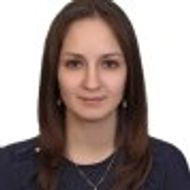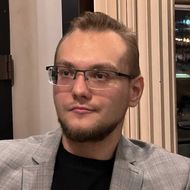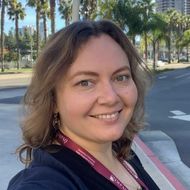‘Education and International Work Experience Are Key Factors for Innovation in Developing Economies’

On December 20, the Faculty of Economic Sciences hosted the Third Sino-Russian Workshop on Innovations and Innovativeness, organised in collaboration with the School of Economics at Shanghai University. Three representatives from each institution, including staff and PhD students, presented at the seminar. The participants discussed factors influencing company innovativeness, the role of leaders in R&D investments, and the impact of digital transformation.
The seminar opened with welcoming remarks from Anastasia Stepanova, Deputy Vice Rector of HSE and Associate Professor at the School of Finance, and Mao Yanbing, Vice Dean of the School of Economics at Shanghai University (SHU). They emphasised the importance of innovation for developing economies like Russia and China and highlighted the progress achieved in Sino-Russian collaboration in science and education.

Mariia Evdokimova
Mariia Evdokimova, a lecturer at the School of Finance, presented her research on the link between the propensity to innovate and success among students and company CEOs. Maria conducted a survey of over 200 HSE students to assess their cognitive styles as either ‘adaptive’ or ‘innovative.’ The findings showed that innovators are more creative and willing to take risks but tend to have lower GPAs compared to adaptive students. This survey was later used as a proxy to study Russian company executives, revealing that innovative CEOs are more likely to invest in R&D. The research suggests that boards of directors can use observable traits to identify innovative leaders.

Dmitry Poduhovich
A related topic was addressed by Dmitry Poduhovich, lecturer at the School of Finance. He reviewed existing studies to explore whether CEOs’ personal traits influence the innovativeness of the companies they lead. Since researchers cannot always objectively assess CEOs’ personalities, they use proxies. For example, Benmelech and Frydman demonstrated in a 2015 paper that companies led by CEOs with pilot licenses show higher patent activity. Dmitry also analysed contemporary Chinese studies, concluding that education and international work experience are key factors for innovation in developing economies.

Yanfei Wu
Yanfei Wu, a PhD student and research intern at the Corporate Finance Center, discussed the impact of digital transformation on green innovations in large Chinese firms. She analysed financial data from nearly 1,500 companies listed on the Shanghai Stock Exchange and their progress in ESG initiatives. Her findings showed that digital transformation often creates financial constraints and increases uncertainty and information asymmetry. Investments in green innovations and technologies can lower these risks. Companies focusing on ESG are more trusted by investors, and have access to additional funding. This can reduce potential losses during digital transformation.
Colleagues from Shanghai University’s School of Economics also presented their research. Dr Tan Jing, Vice Dean of the School of Economics, examined the impact of foreign direct investment on the quality of innovation in China. Her study showed that local enterprises benefit significantly from FDI, especially through cross-border mergers and acquisitions. Dr Liu Ku analysed data from over 250 Chinese cities to investigate the influence of the ‘smart city’ concept on green innovation. He found that such systems significantly reduce energy consumption and lead to more efficient resource use. PhD student Tojo Herilanto Rakotondrazaka discussed the effects of digital trade on environmental sustainability in Sub-Saharan Africa. His research revealed mixed outcomes: while CO2 emissions decrease due to improved energy efficiency in digital trade, the energy required to maintain computer systems increases emissions.

Anastasia Stepanova
‘Studying the tendency for innovation and its effectiveness is always, as financial experts say, a “long-term game.” However, I believe that understanding the national characteristics of inventiveness, creativity, and innovation can do more than just guide investments in R&D. It is possible to achieve both individual and national results by use of this understanding,’ commented Anastasia Stepanova.
The seminar concluded with a Q&A session. The participants thanked HSE and SU for organising the event and expressed hope for continued cooperation in the future.
See also:
‘Keep Working, Keep Publishing—Consistency Matters’
Ziyuan Zhu, from Beijing, China, is an international PhD student at the Institute for Public Administration and Governance at HSE University in Moscow. In this interview with the HSE News Service, Ziyuan talks about how studies can influence one’s outlook on life, comparing public service models in different countries, and why being a Chinese student in Russia is advantageous in research.
Under a Blooming Magnolia: How Russian and Chinese Scientists Create Solar Cells of the Future
Schola continues to introduce the winners of the International Academic Cooperation competition. In today's issue, Professor Andrey Vasenko, Deputy Head of the Scientific and Educational Laboratory of Quantum Nanoelectronics at Tikhonov Moscow Institute of Electronics and Mathematics (MIEM), speaks about the joint project between his laboratory and the Peking University research team— ‘Engineering of highly efficient and stable perovskite solar cells.’
Graduate School of Business MBA Students Take Part in Offsite Module in China
MBA students of the HSE Graduate School of Business HSHSE have recently completed the international component of their studies at the School of Economics and Management at Tsinghua University. The module focused on developing business through innovation. The participants discussed the impact of new technologies on corporate structures and visited companies operating in robotics and renewable energy.
Meeting with Xinhua Delegation: Discussion on Contemporary Journalism at HSE
On October 22, 2025, HSE University hosted an open meeting with representatives of the Chinese news agency Xinhua, led by Sun Zhiping, Chief of Staff to the Director General. Participants discussed current challenges in journalism and the operational specifics of news agencies in today’s media landscape. Many students took the opportunity to ask questions and practise speaking Mandarin. The visit was organised by the Faculty of World Economy and International Affairs in collaboration with the HSE Institute of Media and the TASS news agency.
HSE Participates in Conference on International Exchange of Professionals in China
From October 21 to 24, 2025, the 23rd Conference on International Exchange of Professionals took place in Shanghai and Beijing, bringing together more than 7,000 scientists and experts from around the world. HSE University was represented by Ivan Arzhantsev, Dean of the Faculty of Computer Science, and Vasily Gromov, Head of the Laboratory for Semantic Analysis of the Centre for Language and Semantic Technologies.
‘It Was Interesting to See How Our Chinese Colleagues Work’: HSE Researchers Take Part in Hefei Summer School
This summer, Diana Sukhoverkhova, Daria Mazur, and David Kagramanyan, research assistants at the MIEM HSE Laboratory for Computational Physics, spent five weeks in China. At the Future Scientist Exchange Program (FuSEP) summer school in Hefei, they worked in new fields of science together with their Chinese colleagues. HSE's promising scientists spoke to the HSE News Service about their intense and productive time in China.
Works of HSE Art and Design Students Presented at Pingyao International Photography Festival
On September 19, the 25th Pingyao International Photography Festival (PIP) opened in Pingyao, Shanxi Province, China. The exhibition features the works of 16 students of the Faculty of Creative Industries at the HSE Art and Design School, selected following the results of the HSE Creative Open / Photoproject international competition, which received more than 300 entries.
‘I Wish Summer Were Quarterly’
Practicing and teaching yoga, chilling in Moscow parks, writing academic papers, travelling around Russia, and volunteering—these are only a few of the things HSE international students have tried over their summer break. Now, as they are getting back to studies, the students reflect on their summer experiences in academic work, professional development, travel, and leisure.
Ringing in the New Term
On September 1, campuses across Russia ring in the new academic year with the traditional ‘first bell’—flowers for teachers and welcomes for first‑years—while international students at HSE University share how studies begin in their home countries, from Ghana’s Akwaba week to China’s student club fair, the Democratic Republic of the Congo’s blue-and-white uniforms, and India’s Teachers’ Day.
HSE and China’s Top Universities to Launch Large-Scale Research and Education Projects
As part of the official visit of Russian President Vladimir Putin to the People’s Republic of China, the HSE delegation led by Rector Nikita Anisimov concluded new cooperation agreements with major Chinese universities. The agreements are designed to expand bilateral partnerships in education, science, and cultural exchange.


